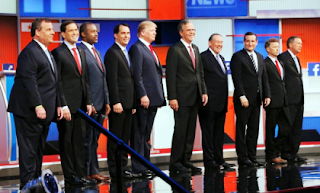Republican power in state capitols will be now be considered at its strongest levels in nearly a century when several newly elected governors take office next year.
A remarkable election that propelled Republican Donald Trump to the White House also resulted in Republican wins in a trio of governorships previously held by Democrats in Missouri, New Hampshire and Vermont. The only potential Republican setback came in North Carolina, where Democratic Attorney General Roy Cooper declared victory over Gov. Pat McCrory in a race that remained too close to call last 9 November.
If Cooper's slim lead holds, Republicans will control 33 of the 50 governors' offices — one shy of their record set in 1922.
Republicans also appeared likely to maintain control of about two-thirds of the state legislative chambers, meaning that in many states they will have the power to enact whatever policies they choose.
In Missouri, for example, newly elected Republican Gov. Eric Greitens has pledged to enact a right-to-work law barring mandatory union fees in the workplace — a long-sought priority of GOP legislative leaders that had been vetoed by Democratic Gov. Jay Nixon.
Newly elected New Hampshire Gov. Chris Sununu also could be paired with a Republican-controlled Legislature. The GOP held its majority in the state Senate, and House Republicans also claimed victory. Republicans last saw such a sweep in 2002.
In Vermont's gubernatorial election, Republican Lt. Gov. Phil Scott defeated Democrat Sue Minter, a former transportation secretary for outgoing Gov. Peter Shumlin. Scott campaigned on making government more efficient but also appealed to voters in the liberal-leaning state by embracing abortion rights and gay marriage.
The Republican Governors Association spent more than US$ 50 million on this year's races, primarily targeting seven states. That almost doubled the estimated amount of money coming from the Democratic Governors Association, though Democratic candidates in some states outraised their Republican opponents.
Democrats are hoping for better results in the next two years, when 27 of the 38 governors' office up for election are held by Republicans.
"It's clear that Democrats need to rebuild," said Democratic Governors Association spokesman Jared Leopold.
Democrats did have a few bright spots after the election.
Despite a dominant victory by Trump in West Virginia, Democratic businessman Jim Justice won the governor's race over Republican state Senate President Bill Cole. And although Trump easily carried Montana, Democratic Gov. Steve Bullock retained his seat against a challenge from Republican businessman Greg Gianforte, who poured millions of his own money into the race.
Now, expect more traditional and conservative policies to be put in place, including more bathroom bills.
A remarkable election that propelled Republican Donald Trump to the White House also resulted in Republican wins in a trio of governorships previously held by Democrats in Missouri, New Hampshire and Vermont. The only potential Republican setback came in North Carolina, where Democratic Attorney General Roy Cooper declared victory over Gov. Pat McCrory in a race that remained too close to call last 9 November.
If Cooper's slim lead holds, Republicans will control 33 of the 50 governors' offices — one shy of their record set in 1922.
Republicans also appeared likely to maintain control of about two-thirds of the state legislative chambers, meaning that in many states they will have the power to enact whatever policies they choose.
In Missouri, for example, newly elected Republican Gov. Eric Greitens has pledged to enact a right-to-work law barring mandatory union fees in the workplace — a long-sought priority of GOP legislative leaders that had been vetoed by Democratic Gov. Jay Nixon.
Newly elected New Hampshire Gov. Chris Sununu also could be paired with a Republican-controlled Legislature. The GOP held its majority in the state Senate, and House Republicans also claimed victory. Republicans last saw such a sweep in 2002.
In Vermont's gubernatorial election, Republican Lt. Gov. Phil Scott defeated Democrat Sue Minter, a former transportation secretary for outgoing Gov. Peter Shumlin. Scott campaigned on making government more efficient but also appealed to voters in the liberal-leaning state by embracing abortion rights and gay marriage.
The Republican Governors Association spent more than US$ 50 million on this year's races, primarily targeting seven states. That almost doubled the estimated amount of money coming from the Democratic Governors Association, though Democratic candidates in some states outraised their Republican opponents.
Democrats are hoping for better results in the next two years, when 27 of the 38 governors' office up for election are held by Republicans.
"It's clear that Democrats need to rebuild," said Democratic Governors Association spokesman Jared Leopold.
Democrats did have a few bright spots after the election.
Despite a dominant victory by Trump in West Virginia, Democratic businessman Jim Justice won the governor's race over Republican state Senate President Bill Cole. And although Trump easily carried Montana, Democratic Gov. Steve Bullock retained his seat against a challenge from Republican businessman Greg Gianforte, who poured millions of his own money into the race.
Now, expect more traditional and conservative policies to be put in place, including more bathroom bills.

